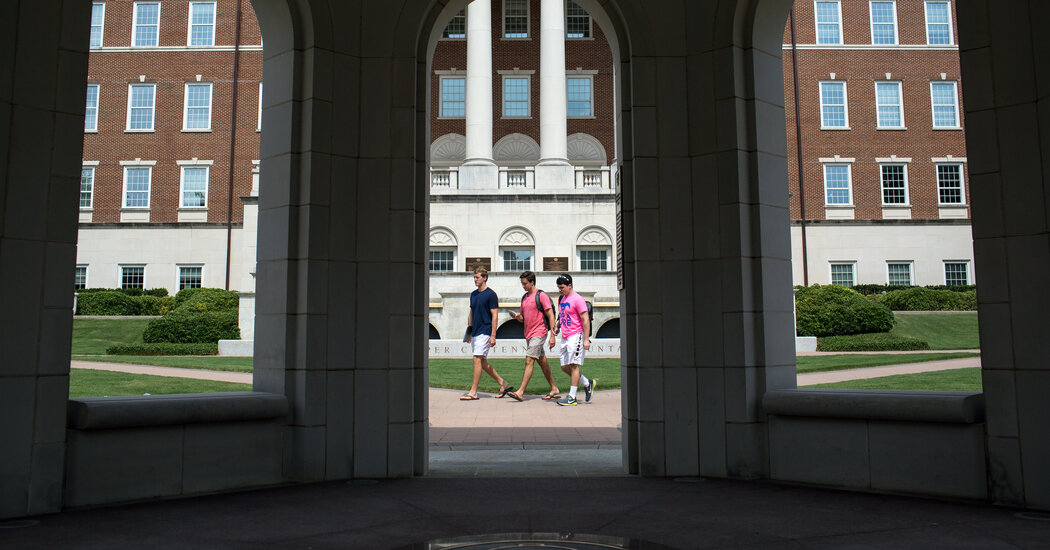Southern Methodist University Wants to Sever Ties to Its Church. Can the Church Stop It?
The Texas Supreme Court will hear arguments on Wednesday in a battle over whether Southern Methodist University can separate from the United Methodist Church. The university, founded in Dallas by Methodists in the early 20th century, has been trying to extricate itself since 2019, a period of intense turmoil in the denomination over whether the church should accept gay clergy or gay marriage.
At stake is the question of who ultimately controls the university: its own board or the church that founded it more than a century ago and wrote its ownership into the school bylaws. The case will determine whether one of the flagship institutions of Methodism will remain connected to the church, which is the country’s second-largest Protestant denomination.
The private university abruptly changed its articles of incorporation in 2019 to name its own board as its “ultimate authority.” That move displaced one of the church’s regional governing bodies, the South Central Jurisdictional Conference, which oversees congregations in eight states including Texas.
The university’s articles of incorporation previously stated that the school would be “forever owned, maintained and controlled” by the conference, which had a say in selecting and approving board members, including three United Methodist bishops.
In response, the conference sued Southern Methodist, arguing that the university did not have the authority to declare independence without the church’s approval. A Texas district judge ruled in favor of the university in 2021, but an appeals court reversed the decision.
Southern Methodist University was founded in the early 20th century by Southern Methodists who wanted to establish a flagship institution west of the Mississippi River. But today, the university and the church’s conference have relatively few practical entanglements. Representatives from the conference do not participate in hiring decisions, and the conference has made no direct financial contributions in “nearly a decade,” according to a brief filed by the university.
The university’s president, R. Gerald Turner, said in 2019 that the school needed a formal separation from the church because of turmoil over its stance on gay rights — which the university argued impeded its ability to attract students from all denominations. Among students who report a religious affiliation at Southern Methodist, about 9 percent are MethodistMethodists are less than 4 percent of the U.S. population.
At the time, the denomination approved a plan strengthening bans on same-sex marriages and gay and lesbian clergy. Dr. Turner told The Dallas Morning News that year that the school wanted to sever formal ties before the church splintered.
But in the years since, dynamics in the church have changed drastically. In 2024, the church overturned the longstanding ban on “self-avowed practicing homosexuals” as clergy and officially allowed same-sex marriage. By that time, more than a quarter of the denomination’s churches had already departed over their disagreements. Some have remained independent, and others have joined the new Global Methodist Church, a rival denomination that says it will not ordain or marry gay people.
A spokeswoman for the university, Megan Jacob, said the school does not comment on pending litigation.
Although there is no direct financial relationship between the school and the church, the relationship is important to the church and its dissolution risks “diminishing the distinct Methodist character that has shaped the university’s identity,” the Rev. Dr. Derrek Belase, chairman of the South Central Jurisdiction Mission Council, said in a statement.
In a brief filed on behalf of the church, the Becket Fund for Religious Liberty argued that if the court allows the university to unilaterally separate itself from the church, it would violate the legal principle of church autonomy, overriding church-written bylaws and essentially letting the government interfere in ecclesiastical affairs.
“At the core of this case is the question of who decides” how religious institutions are structured, said William Haun, senior counsel at the Becket Fund. He said it could have a “chilling effect” on churches and other religious organizations that are considering opening an affiliated college, hospital or homeless shelter.
Critics of the separation said the university had done little to include the church’s input in the decision.
“It was deeply offensive to church leaders to be thrown aside,” said Ted Campbell, a retired elder of the Texas Annual Conference of the United Methodist Church. “It felt like we were being ignored.” Dr. Campbell is also a professor at the university’s Perkins School of Theology.
Many prominent American universities were founded with distinctly religious missions but later shed their formal ties and Christian identities.
Vanderbilt University, another school founded by Southern Methodists, declared itself independent of the church before Southern Methodist University was founded, a severance ultimately supported by the Tennessee Supreme Court. In response, church leaders enshrined the church’s connection to Southern Methodist in the school’s bylaws.
In the century that followed, Southern Methodist grew in the direction its ambitious founders imagined. It now has 12,000 students and an endowment of more than $2 billion. Dr. Turner, who became president in 1995, landed George W. Bush’s presidential library in 2008. The school joined the Atlantic Coast Conference last year, and its football team made the playoffs.
The board announced last week that Jay Hartzell, currently president of the much larger University of Texas at Austin, will be Southern Methodist’s next president.

